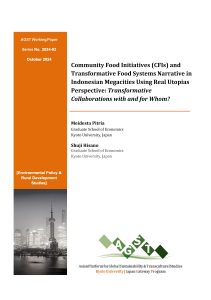No.2024-02
October 2024
Community Food Initiatives (CFIs) and Transformative Food Systems Narrative in Indonesian Megacities Using Real Utopias Perspective: Transformative Collaborations with and for Whom?
Number
No.2024-02
Month of Issue
October 2024
Title
Community Food Initiatives (CFIs) and Transformative Food Systems Narrative in Indonesian Megacities Using Real Utopias Perspective: Transformative Collaborations with and for Whom?
Author(s)
Meidesta Pitria
Shuji Hisano
Affiliation(s)
Graduate School of Economics , Kyoto University
Keywords
Community Food Initiatives, Transformative Food Politics, Food System Transformation, Real Utopias, Urban Food Initiatives
Abstract
Our globe is rapidly urbanizing, with more than half of the world's inhabitants currently living in cities. Cities have been deemed heavily reliant on rural areas for food provisioning. Over the past decade, numerous activists in Indonesia have initiated food-related practices in urban areas to rework, realize, and challenge the current food system through community food initiatives (CFIs). Some scholars contend that similar food projects in cities of the Global South primarily emphasize food production without aiming for transformative outcomes. Nowhere is the possibility for change more significant than in cities, where the State or local government, as examined in this study, are closer to citizens, and the power and growth of decentralization have also contributed to cities' rise as critical powers. This study investigated the potential of CFIs for food system transformation, employing real utopias, transformative food systems, and transformative food politics as theoretical frameworks. The real utopias approach was applied to understand 1) critique and diagnosis as drivers of CFI emergence, 2) CFIs as initiated alternatives, and 3) CFIs' transformative strategies. This study employed case studies from three different CFIs with different types of food initiatives in the Jakarta-Bandung urban area, Seni Tani, Kebun Kumara, and Selarasa Food Lab, to better understand the transformative orientation of CFIs in Indonesian megacities. The data were collected using secondary resources such as social media, websites, and online articles. They were analyzed using a narrative approach with coding using NVivo software. This study found that the city’s reliance on the lengthy food supply chain disconnected urban inhabitants from their food and nature, and unmanageable food waste became their main critique. Each CFI has a different approach to the State in achieving its dreams of providing alternative and transformation strategies. Seni Tani employed a symbiotic approach by expanding their relationship with the local government, academics, and international organizations. On the other hand, Kebun Kumara and Selarasa Food Lab adopted an interstitial approach. Kebun Kumara increased its cooperative endeavors with local businesses and creative industries, while Selarasa Food Lab expanded its collaboration efforts with other CFIs, mostly farmers groups. Each CFI's distinctive agenda and strategies may not have genuinely transformed the food system. Still, it is oriented toward achieving this, particularly in urban areas where regional and international development agendas are being addressed.




